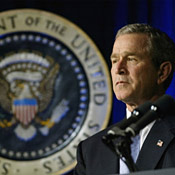- REVIEW
- READER REVIEWS
No End in Sight
|
|
Genre
Documentary
Producer
Charles Ferguson, Jennie Amias, Jessie Vogelson
Distributor
Magnolia Pictures
Release Date
Jul 27, 2007
Release Notes
NY/DC
Official Website
Review
Charlie Ferguson’s No End in Sight depicts the first year of the Iraq occupation, after the mission was accomplished, through the eyes of the diplomats, journalists, officers, and enlisted personnel who watched the country spiral into chaos. Their tone—almost universally—is neither angry nor mournful. They are bewildered. They’re like passengers who yelled Red light! to a driver who insisted it was green or pretended not to hear or simply thought, It doesn’t matter what color it is because I know where I want to go, and mowed down scores of pedestrians. Bewilderment: a funny tone for a film that is, finally, so incendiary.
Ferguson isn’t a clownish lefty rabble-rouser like Michael Moore. He’s a policy wonk with a doctorate from MIT, a member of the Council on Foreign Relations, and the author of three books on information technology. He’s interested in How Things Work—and Fall Apart. Soberly narrated by Campbell Scott, the film is a meticulous, thoroughly engrossing lesson in how not to win friends (or wars) and influence people (or potential terrorists). The best way, it emerges, is not to pay attention, before making a big decision, to people who know stuff.
Many of Ferguson’s examples turn on that word, decision, and go something like this (I’m paraphrasing): “John Q. Bozo, a Rumsfeld/Cheney appointee with no background in reconstruction or government planning, no history of military service, no knowledge of Arabic, no firsthand experience of conditions on the ground (having never set foot on Iraqi soil), made the decision, against the increasingly urgent advice of the Office of Reconstruction and Humanitarian Assistance (ORHA), the CIA, military personnel, and anyone who knew anything about the region or the laws of cause and effect, to set in motion a policy that would ultimately unleash all the forces of chaos and destruction in the universe. He was subsequently awarded the Presidential Medal of Freedom.” A title then announces that John Q. Bozo declined to be interviewed—as did Cheney, Rumsfeld, Paul Wolfowitz, Colin Powell, Condoleezza Rice, Paul Bremer, and Douglas Feith.
One who—admirably—did not decline is Walter Slocombe, a senior adviser to Bremer’s Coalition Provisional Authority. It falls to Slocombe to defend such Rumsfeld-Wolfowitz decisions as keeping the ground forces small—too small to, say, guard huge ammunition dumps that were subsequently scavenged by insurgents. Stalwart though he is, Slocombe does not rise to the occasion; as he senses the dimensions of the quagmire (vis-à-vis the interview, not Iraq), you catch his eyes searching for a fire alarm to pull. Bremer, in a clip from Frontline, does better when asked to recall ORHA director Jay Garner’s plea not to fire 50,000 Baathist officials who might have helped maintain the country’s infrastructure: Did Garner say that? He might have. It’s possible. There was so much going on. Memory is such a fragile thing.
The most visibly haunted interviewee, Colonel Paul Hughes, was no more successful than Garner in reversing another fateful decision: to throw half a million Iraqi soldiers out of work, thus creating half a million pissed-off potential insurgents with access to weapons and a lot of time on their hands. Hughes says there’s a direct link between that act and the start of the insurgency—the existence of which is repeatedly denied by Rumsfeld, who ridicules the “Henny Pennys who say the sky is falling.” (And Voldemort has not come back, he does not add.) You can read about this period in Fiasco, Hubris, The Assassins’ Gate, Imperial Life in the Emerald City, Blind Into Baghdad, and other books. But pictures—even of talking heads—help focus one’s outrage, and Ferguson’s juxtapositions are quietly devastating. Vastly experienced ambassador Barbara Bodine gets her walking papers for not playing well with others while the Green Zone becomes a Club Med for dishy college grads whose rich daddies gave big bucks to the Republican Party. (One is put in charge of overseeing all traffic in the Iraqi capital.) As attacks on Americans rise, George W. Bush—whose own rich daddy saved him from Vietnam—does his cowboy number. “My answer is, Bring them on,” he says, manfully—at a time, Ferguson reports, when only one in eight Humvees had adequate armor to withstand roadside bombs. In November 2004, Cheney sneers that the insurgency (heretofore said not to exist) is “in its death throes.” By the time the film ends (late 2006), the chickens have come home to roost. But the chicken hawks still rule. Although I’d be personally inclined to depict Cheney and Rumsfeld as figures out of Men in Black, splitting open to reveal giant cockroaches, No End in Sight proves there’s nothing more subversive than a somber, lucid recitation of facts. Ferguson doesn’t linger on the subject of fat, no-bid contracts for administration friends—that’s the thrust of another documentary, Iraq for Sale. Nor is he reckless about ascribing motives to the war’s architects. We can argue about what they aimed to do. What they did, the film drives home, was criminal negligence at best. To say what it was at worst you’d need Dante.
Related Stories
New York Magazine Reviews
- David Edelstein's Full Review (7/30/07)
Featured In
- The 2007 Culture Awards in Movies (12/17/07)
